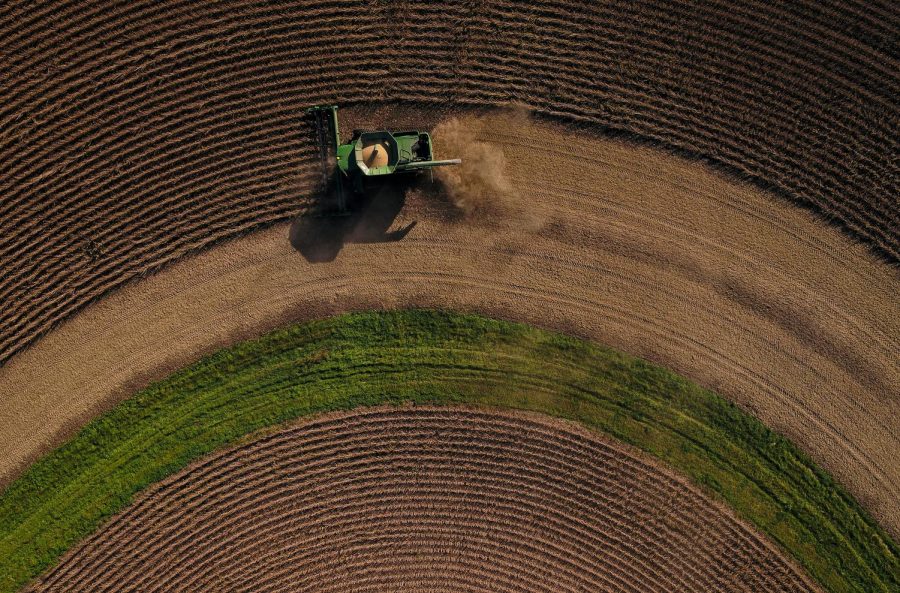Bring mental health awareness to rural farmers
Toxic masculinity, poor access to healthcare leads to depression, high suicide rates for rural communities
AARON LAVINSKY | Tribune News Service
Men living in rural America often feel isolated without having an outlet to express their feelings due to social stigma.
March 8, 2018
Men in farming communities around the nation are suffering. According to a review of hundreds of studies by Jameson Hirsch, an associate professor in the psychology department at East Tennessee State, suicide rates for men in rural farming communities are much higher than in urban areas.
Toxic masculinity creates an environment that does not allow men to talk about their suicidal thoughts and depression. This stigma, in combination with the strenuous nature of the farming industry, creates an environment that fosters suicide and depression at higher rates than almost anywhere else in the nation.
Ashton Stevens, a recent graduate of WSU, talked about her experience growing up in a small rural farm in Eastern Washington. Her family has been farming the same land for the last five generations.
“It’s a really silent problem,” Stevens said. “There’s probably a lot more going on than we even realize.”
Farming is a tough job that requires rigorous amounts of manual labor with unpredictable outcomes. Stevens said these conditions cultivate a heavy responsibility on the head of the household.
“With farming specifically, there are no sick days,” Stevens said. “There’s no boss to help you out. You are really, truly on your own. If you can’t get up and do something, there’s no one else who can.”
Stevens explained that this responsibility can cause men to shut down emotionally.
“It’s the man that everyone looks to,” she said. “They’re the head of the family. If he can’t get up and do what he needs to do, then the family is really going to struggle.”
There is a stigma attached to men in traditionally masculine careers like farming, Stevens said. Because the predominant family structure places men in a position where they must provide for their family, a lot of the stress falls on them. Often men must be strong for their family or they are seen as failures. It is seen as weak to admit to feeling symptoms of depression.
“You would be deemed as kind of crazy if you admit that you are struggling,” Stevens said. “So you just tell everyone that you are tired and worn out. Once you admit that you are actually struggling mentally, you’re admitting that you are weak and that you can’t support your family.”
Stevens explained that toxic masculinity is not the only issue rural farmers face. Alcoholism is an aggressive problem in these secluded communities.
“I have an uncle who’s divorced,” Stevens said. “The men that he surrounds himself with are a lot of other single men. They drink a lot. Just constant drinking.”
Stevens explained that while therapy sounds like an excellent possible solution to alcoholism and depression, there are many barriers that stand in the way.
“A big issue is health insurance,” she said. “Farmers are self-employed. They have to secure their own benefits. Even to this day, my family does not have dental or eye insurance.”
The isolated nature of farming also influences the search for mental health professionals.
“If my dad were to go see a therapist, he would have to drive at least 20 to 30 miles,” Stevens said. “Then our insurance wouldn’t cover it on top of it all.”
Affording anything, from health insurance to groceries, is difficult due to the unpredictable nature of farming. Stevens said that during times of stability, her mom would tell her to pick out anything she wanted at the mall, while other times they would go a year wearing torn-up shoes because they couldn’t afford new ones.
Hirsch’s review found the most aggressive spikes in depression and suicide among farmers were during periods of sudden financial loss.
The issues go unheard. Farmers across the nation remain strongly silent while carrying these burdens. A discourse needs to be opened that allows male farmers to talk about alcohol abuse and depression.
Just because these individuals live in rural America, that does not mean that they should remain out of sight and forgotten.





















